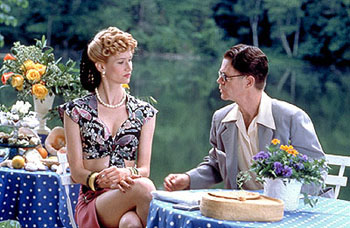![[Metroactive Movies]](/movies/gifs/movies468.gif)
[ Movies Index | Show Times | Silicon Valley | Metroactive Home | Archives ]
 Mistaken Identities William H. Macy and Laura Dern have their worlds turned upside down in 'Focus.' Hate Week New film version of Arthur Miller's 'Focus' is an instant antique about intolerance WHEN AN Arthur Miller drama is playing, not just the actors have their marks chalked out for them. Everybody in the audience knows just where to stand, too. Death of a Salesman enjoys its status as a classic because it addresses discontents no playwright of the era had dared to mention. But is it a good play? Can it be, when we all come out of it so certain of ourselves, so reassured that we wouldn't have fired Willie Loman? (I've enjoyed the actors who liked parodying Death of a Salesman's bombast: Albert Brooks' proposal of a kid's-theater version on Saturday Night Live; Kevin Kline, in the film Soapdish, trying to shout out the lines over the noise of an audience of crotchety oldsters at a Florida dinner theater.) The film Focus, based on an early novel by Miller, may look like inferior, justly forgotten work. Yet it evinces the lack of uncertainty that marked Miller's later writings. There's still room for ambiguity even in plays about morally unambiguous situations--in real life, it's damned rare to be in a completely unambiguous situation. Unfortunately, there's nothing but cut-and-dried morality in Focus, which seems meant to be screened in a high school class on tolerance. After Sept. 11, we're all supposed to be sitting in that high school class; expect this film to be heralded by the nation's critics as a much-needed lesson against prejudice. Focus is badly dramatized, and it's old material from a writer just starting out. Here are the same problems as in Miller's more famous work: the lecturing, the awkward specifying of the author who laid down the law: "A man is not a piece of fruit! You can't just throw away the peel!" William H. Macy plays Larry, a man with an orderly, happy life and a good job during the middle of World War II. He lives in a clean, decent suburban New York City neighborhood. When he gets a new pair of glasses, he instantly loses his job. The glasses keep him from making a front-office impression, or so his boss says. The real problem, we learn, is that the glasses make Larry look Jewish. These spectacles also arouse the suspicions of his viciously anti-Semitic neighbor Fred (played by the artist formerly known as Meat Loaf, and now billed as Meat Loaf Aday--meat loaf a day is enough for any man). Beefy Fred and some of the other neighborhood men are disciples of a "Father Crichton," easily recognizable as the fanatic radio-priest Father Charles Coughlin, the Rush Limbaugh of his era. Larry can't find a new job, except, finally, with a Jewish employer. At his new office, he remeets Gertrude Hart (Laura Dern), a girl he once refused to employ, ironically because he thought she looked Jewish. A romance awakens the further anger of the neighbors who suspect Gertrude of being a Jew. Finklestein (David Paymer), the corner newsstand operator, is attacked. Paranoia increases. The pressures on Larry are represented fancifully in fantasy sequence of the gears of a merry-go-round clashing and grinding. For one thing, what was the sense in updating a '30s-style story to the '40s? The novel Focus was published in 1945, but it's obviously set much earlier. Was first-time director Neil Slavin aware of the difference between the decades? It was very easy to get work during the war, since so many men had been drafted. And why would Larry have had to go long hard miles to find a Jewish employer in Manhattan? (Focus might have been more logical if it were set in Indiana instead of New York City.) Moreover, Coughlin had ended his career as a Jew-baiter by the middle of 1940. In casting the very Nordic Laura Dern, Slavin might have been making a point. Focus might have had resonance if, as in Kafka, there'd been no name or no reason for why the oppressed couple were suddenly shunned. The ending of the film confuses this point: we're not completely sure that Larry and Gertrude were actually passing for Christian. I'm a gentile. I realize no gentile has an idea how insidious anti-Semitism is. Still, in this drama, it's as if Gertrude and Lawrence were dropped in from Mars, as if they had never heard that Jews were shunned, hated or restricted. As this instant antique goes, we know how we're supposed to react. Watching it, we can congratulate ourselves for our open minds. So Focus is risk-free, and moreover it's not very entertaining. Dern is sex on wheels, with her Betty Grable coiffure and her tarty, tight '40s costumes (nice to look at, these dresses, but awfully flamboyant for the office). As for Macy, he does what he always does best, embodying the dignity of a little man rising up. I believed both of them while not believing a minute of this movie.
Focus (PG-13; 106 min.), directed by Neal Slavin, written by Kendrew Lascelles, based on the book by Arthur Miller, photographed by Juan Ruiz Anchia and starring Laura Dern and William H. Macy, opens Friday at Camera 3 in San Jose. [ Silicon Valley | Metroactive Central | Archives ]
|
From the November 1-7, 2001 issue of Metro, Silicon Valley's Weekly Newspaper.
Copyright © 2001 Metro Publishing Inc. Metroactive is affiliated with the Boulevards Network.
For more information about the San Jose/Silicon Valley area, visit sanjose.com.